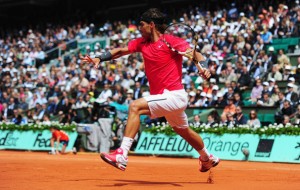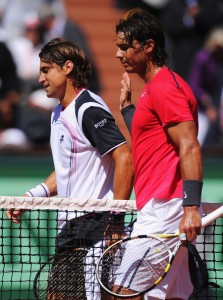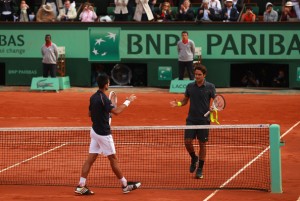French Open, Day 13
(2) Nadal d. (6) Ferrer, 6/2 6/2 6/1
(1) Djokovic d. (3) Federer, 6/4 7/5 6/3
By the time a tennis tournament has been reduced to just four men – continuing with my nuclear chemistry theme from the other day, I will term this point the semifinals – one’s idea of what constitutes an entertaining day’s play mostly becomes a matter of perspective. Earlier in the event there’s enough going on that even if the match you’d been anticipating turns out to be a damp squib, there will inevitably be fireworks elsewhere. (If Fabio Fognini is still about, there’s bound to be a Roman candle.) But when there are only two matches, played consecutively on the same court, what you see is what you get. When you don’t get to see much, you’re apt to feel some disappointment, even as you mouth mute praise that the matches at least aren’t being conducted simultaneously.  As I say, however, ‘much’ is here a debated issue. I have little doubt fans of Rafael Nadal found the experience worthwhile, even as they graciously observed a moment’s silence for his opponent.
As I say, however, ‘much’ is here a debated issue. I have little doubt fans of Rafael Nadal found the experience worthwhile, even as they graciously observed a moment’s silence for his opponent.
At other majors, such as the Australian Open, the two semifinals aren’t even played on the same day, which makes a ticket to either of them a very expensive way to watch a blowout, if that’s what eventuates. 2007 was a good example of this. The second semifinal saw Fernando Gonzalez demolish Tommy Haas with the most terrifying display of ball-striking since . . . well, since Roger Federer inflicted one of the sport’s most notorious beat-downs on Andy Roddick the night before. For fans of Federer and Gonzalez, it was naturally money well spent. For those hoping for a more engaging contest, it was all over rather too fast. I have little statistical justification for this, but I’ve always felt the semifinals of a major are often its best matches, and so the disappointment when they turn out to be anything but is compounded. Again, your mileage will vary. A tournament is supposed to build towards something. ESPN’s coverage is based on the assumption of a story arc. This perhaps explains why ESPN have given up and gone home, out of sheer disgust. NBC have stuck around, though I’m not alone in wishing they hadn’t. John McEnroe sounded so bored he was almost fascinating towards the end of the second semifinal. World fame has insulated him from this sensation for too long, apparently. He unleashed tedium as though he was rediscovering it.
Anyway, the long and short of it – let’s be frank, the short of it – is that Nadal reduced David Ferrer to his constituent elements with frightening efficiency, and often faster than my bleary eye could follow. At one point he fell on his bottom, took the time to wipe his hand on his shorts twice, and still won the point. In all he won 83 points to Ferrer’s 48, and, as a percentage, won more points on return than Ferrer won on first serve.  Jim Courier remarked that Ferrer needed to play recklessly. Judging by his uncharacteristic quantity of errors he was already playing recklessly, or maybe just badly. Any more recklessly and he would have lost even more rapidly, had that been possible. The world No.2 was just incredibly good at almost every facet of the game that matters, although his penmanship remains otherwise sup-par (there, I said it). I can hardly recall him moving with this kind of easy assurance since 2008. He will almost certainly win the final. It was Ferrer’s first Roland Garros semifinal, and it was an experience he won’t ever forget. Trauma is peculiar that way.
Jim Courier remarked that Ferrer needed to play recklessly. Judging by his uncharacteristic quantity of errors he was already playing recklessly, or maybe just badly. Any more recklessly and he would have lost even more rapidly, had that been possible. The world No.2 was just incredibly good at almost every facet of the game that matters, although his penmanship remains otherwise sup-par (there, I said it). I can hardly recall him moving with this kind of easy assurance since 2008. He will almost certainly win the final. It was Ferrer’s first Roland Garros semifinal, and it was an experience he won’t ever forget. Trauma is peculiar that way.
A few hours later Novak Djokovic somehow fashioned a straight sets win over Federer out of a pair of train wrecks, proving, yet again, to be a master at constructing affordable art out of found objects. Federer led by a break in the first two sets, except for the second one, when he led by two breaks. Then he was broken back in about 35 seconds, and then again more slowly. Then he broke again to lead 5/4, thereby earning the privilege of serving for the set. It was about that confusing, a tangled mess of missed chances. There was something wrong with Djokovic’s leg or back or breathing, and as a consequence he was playing more aggressively, the way he did in last year’s Rome final, or the fourth set of the US Open final. Federer displayed great variety in his utterance of the phrase ‘Come on’, especially through the first three games, as it crescendoed from a menacing rumble to a sforzando exclamation upon gaining that crucially unimportant second break. Until this moment, he was really into it. Upon blowing the second set for the sixteenth time, he seemed to lose a measure of interest, taking the crowd and the commentators with him. He fell down an early break in the third, and Matt Cronin on Radio Roland Garros proffered the amazing opinion that Federer would now find it very difficult to win the French Open. This was hard to fault for accuracy.
In the end Djokovic ran away with it. It transpired that those who had hoped for a classic, based on last year’s masterpiece, were revealed as being prone to wishful thinking. I confess I was among them, despite the fact that neither Federer nor Djokovic had played at all well so far in the tournament.  Even Mahut and Isner, with a radio antenna perched atop his lofty frame, could not provoke lightning to strike a second time, so what hope did a pair of amateurs like Djokovic and Federer have? It was still disappointing.
Even Mahut and Isner, with a radio antenna perched atop his lofty frame, could not provoke lightning to strike a second time, so what hope did a pair of amateurs like Djokovic and Federer have? It was still disappointing.
In the final Djokovic will endeavour to become the first man since Rod Laver to hold all four majors at the same time. Nadal will attempt to win his seventh French Open title. Naturally, we have all known about this for weeks. The prevailing narrative is now that this was the final we all apparently wanted (except for those who didn’t), since neither of these respective records would mean quite as much if this pair didn’t have to face each other. We can toss some ‘unstoppable force – immovable object’ metaphors into the mix for good measure. There’s also some stuff about Nadal getting revenge for past major finals. So now we have a revenge tale between titans that was destined to occur. That’s narrative. Where’s ESPN?

8 Responses to Scarlet Billows